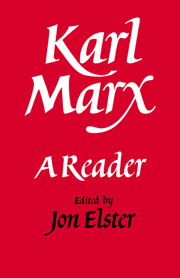V - Historical Materialism
Published online by Cambridge University Press: 05 June 2012
Summary
The expressions “historical materialism” and “the materialist conception of history” were coined after Marx's death. They are somewhat misleading, in suggesting a systematic, coherent body of doctrine. Actually, Marx's theory of social structure and historical change has to be reconstructed from a number of texts whose nature and purpose differ widely. Some of them, such as Selections 14 and 15, have a quite general character. They consist of a series of propositions intended to be valid for all the historical modes of production – the Asiatic mode of production, slavery, serfdom, and capitalism. Others deal with specific historical phenomena, but are nevertheless useful for filling in gaps in the more general texts. Selection 16 is a very suggestive and influential analysis of precapitalist modes of production. Selection 17 is an equally influential brief statement of the successive transitions from feudalism to capitalism and from capitalism to communism. Selection 18 offers a more elaborate analysis of the transition to capitalism.
FROM THE GERMAN IDEOLOGY
This work contains numerous passages which, taken together, amount to Marx's most complete presentation of historical materialism. Among the texts reproduced here, Passage A sketches the first of Marx's several periodizations of history. Passage B, a more extensive statement, lays out the agenda for a lifetime of work. Among the themes struck here are: the all-sided self-realization of the individual under communism; the conditions for the communist revolution; the role and nature of the state.
- Type
- Chapter
- Information
- Karl MarxA Reader, pp. 169 - 222Publisher: Cambridge University PressPrint publication year: 1986



